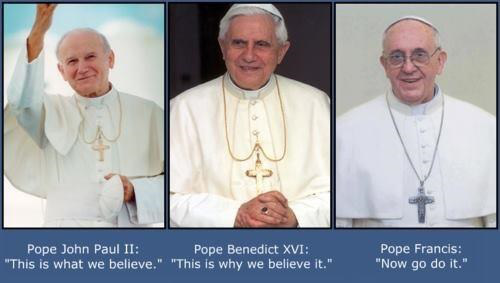The Gospel today again points to Jewish leaders of the time trying to trap Jesus. Jesus says to them,
“Are you not misled
because you do not know the Scriptures or the power of God?
When they rise from the dead,
they neither marry nor are given in marriage,
but they are like the angels in heaven.
As for the dead being raised,
have you not read in the Book of Moses,
in the passage about the bush, how God told him,
I am the God of Abraham, the God of Isaac,
and the God of Jacob?
He is not God of the dead but of the living.
You are greatly misled.”
It made me think about all the incredible pilgrimage site throughout the world. We can see and touch the places where Jesus and the saints lived. But we can no longer see them. When we return from pilgrimage and the spiritual high that we experienced begins to wear off with the normal burdens of life, what then? We continue to see Jesus and the saints present in the Eucharist and in the effects of their presence.
The problem for the Sadducees was that they were grounded too much in what they saw. They didn't necessarily believe in the resurrection, which they could not see. That made me think of an answer our Pope-Emeritus, Benedict XVI gave to a first communicant in a catechesis back in 2005. I have provided that exchange below. The girl's name was Andrea. And the former Holy Father shows that, though very intellectual, he can break-it-on-down for even an 8 year-old.
In preparing me for my First Communion day, my catechist told me that Jesus is present in the Eucharist. But how? I can't see him! (Andrea)
No, we cannot see him, but there are many things that we do not see but they exist and are essential. For example: we do not see our reason, yet we have reason. We do not see our intelligence and we have it. In a word: we do not see our soul and yet it exists and we see its effects, because we can speak, think and make decisions, etc. Nor do we see an electric current, for example, yet we see that it exists; we see this microphone, that it is working, and we see lights. Therefore, we do not see the very deepest things, those that really sustain life and the world, but we can see and feel their effects. This is also true for electricity; we do not see the electric current but we see the light.
So it is with the Risen Lord: we do not see him with our eyes but we see that wherever Jesus is, people change, they improve. A greater capacity for peace, for reconciliation, etc., is created. Therefore, we do not see the Lord himself but we see the effects of the Lord: so we can understand that Jesus is present. And as I said, it is precisely the invisible things that are the most profound, the most important. So let us go to meet this invisible but powerful Lord who helps us to live well.
Application: When doubting God's existence or the Real Presence, what effects can you see around you that cannot be explained simply by what is seen? For me it's when I see "coincidences". I know better. As the Pope before the Pope-Emeritus said, there are no coincidences with God.CATECHETICAL MEETING OF THE HOLY FATHERWITH CHILDREN WHO HAD RECEIVEDTHEIR FIRST COMMUNION DURING THE YEARSaturday, 15 October 2005


No comments:
Post a Comment